The recent celebration in Germany and internationally of 30 years since the destruction of the wall between East and West Berlin, meaning families were no longer separated, is very poignant for many Germans of the older and younger generations, as well as for Germans living abroad like a citizen of Rye.
Very little is made of it in this country, but the significance of the Berlin Wall falling is that, at the beginning of 1990, East and West Germans, with family and friends on both sides, were able to come together for the first time in almost three decades.
As a result of the London Protocol signed on September 22, 1944, the United States, the United Kingdom and Soviet Union limited German borders to its 1937 territory, and the Berlin area was divided into occupied zones.
At the end of World War II in September 1945, the Allies divided Germany into three zones and a special Berlin area. The Soviets occupied East Germany as well as half of Berlin and installed a rigidly controlled communist state where no-one had free speech and no anti-communist comments were allowed. This resulted in a lot of fear as no one knew who was a friend or an enemy and the “Stasi” (state police) was everywhere.
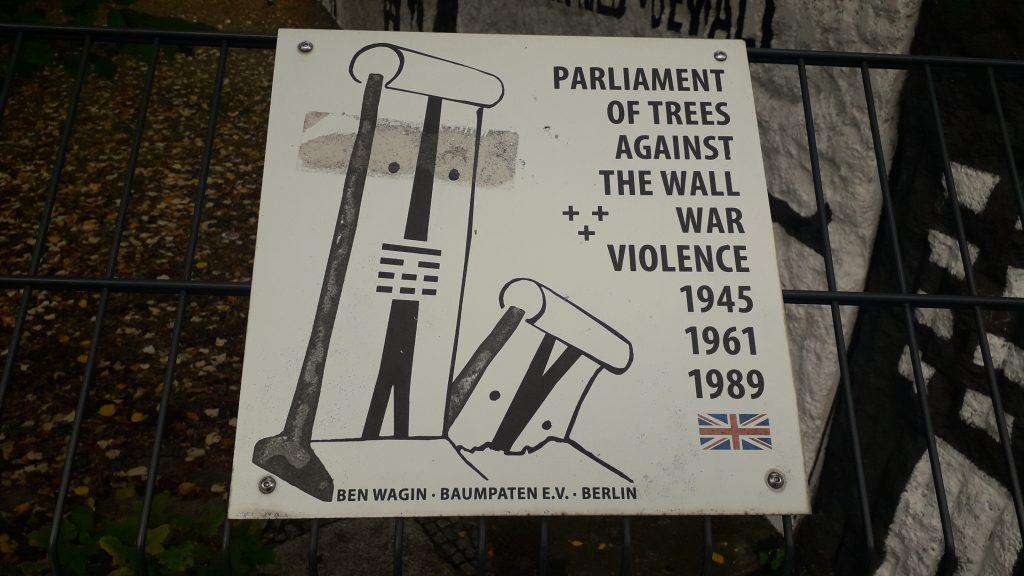
Many people tried to escape into the West, but this was stopped by the communist government in 1961. Overnight a white line appeared demarcating the border between East and West Berlin which was soon followed by the actual wall. It was guarded fiercely and over the time it existed many were killed trying to get to the West.
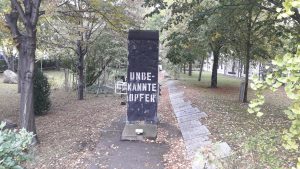
Foreign diplomats, members of the military and tourists were allowed to pass, but with stringent checks at the border. To give a little taste of living under the communists I will tell you just the basics of a story experienced by a little girl who was born in Berlin – but ended up in Rye.
The family fled to Austria, because it was found out near the end of the war that the father came from a Romanian Jewish background and his parents had fled from Sudetenland when Hitler’s men showed an interest in such families. However (later) life under Communism was little better as this story explains.
Life was not easy in Austria, with the child and her slightly older brother growing up basically on their own and, after nine years, one day, without explanation or “see you soon”, the girl was sent alone to East Germany, to friends of her parents.
Why this was, is of course, another story. The child had no choice but to adapt to her new family who were very kind and loving – something which she had not known before.
The new family were socialists (and opposed to communism) so the girl was told not to speak to anyone at school about home, and the tension if someone knocked on the door did not escape her – young as she was.
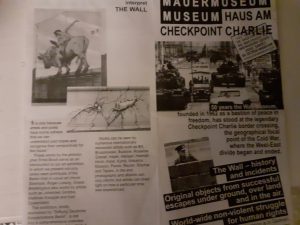
Life went on under a cloud of psychological fear, until one morning, after about two and half years, the little girl was told by her adopted aunt that she was not going to school, that she had to leave the family, but that it was not her fault.
The child, of course, did not understand that it was the political chaos. She was told that several cars in succession would take her back to her parents in West Germany and she should obey the drivers who were friends, and that they might have to hide her under a blanket to get her through the border – an explanation which, to her, was like a foreign language.
Another wrench in her young life, and many tears later, she was smuggled across and deposited in a children’s home in the West.
To understand this decision it is important to know that in 1953 there was an uprising in Hungary and around against the communists, and the family were afraid that eventually they would not get the girl back into the West. The Soviet Union punished contact with the West, and the family had not registered her presence because of that.
One day, after six months, an angry young teenage boy arrived at the children home. It was her brother, who had been sent to England about the same time she was sent away, to an uncle, but brought back to Germany against his will.
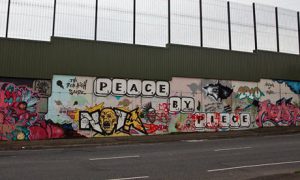
Eventually, after another six months, their mother arrived to pick them up, and family life resumed in a small apartment in Lohausen, near Dusseldorf, where the parents had moved to from Austria, only to break up shortly after – and the children were again left to their own devices.
As an adult she is often asked “Are you not angry with your parents?” She is able to answer honestly: “How can I be, when they lived through the devastation of war, being bombed out several times as Berlin was destroyed, and my father was forced to go to Russia. Their past seems more traumatic than mine, the next generation.”
Another short period of self sufficiency followed as her father had left and her mother was working. The girl, now 16 was sent off again, though this time voicing her displeasure at having her schooling disrupted.
Just the same her mother had found a family in England through a friend where she started the rocky road to find herself, never quite feeling rooted anywhere, to – eventually, after many cross roads – semi-retire in the small, beautiful, historic Cinque Ports town of Rye.
There are many stories of pain and suffering in the wars and afterwards, as well as the experience of living under a controlled state, which does shape a person’s psyche. So, while this short example is not unique, it was for this child.
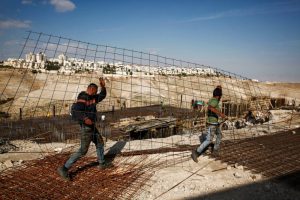
The sadness is of course that no lessons have been learned as new “brick walls” have been built (or kept, like those in Belfast, (see photo above, or in Israel/Palestine, see photo right), in the last 30 years and are being built now, as well as psychological ones, in this country.
Image Credits: Heidi Foster , Heidi Foster (from leaflet) .



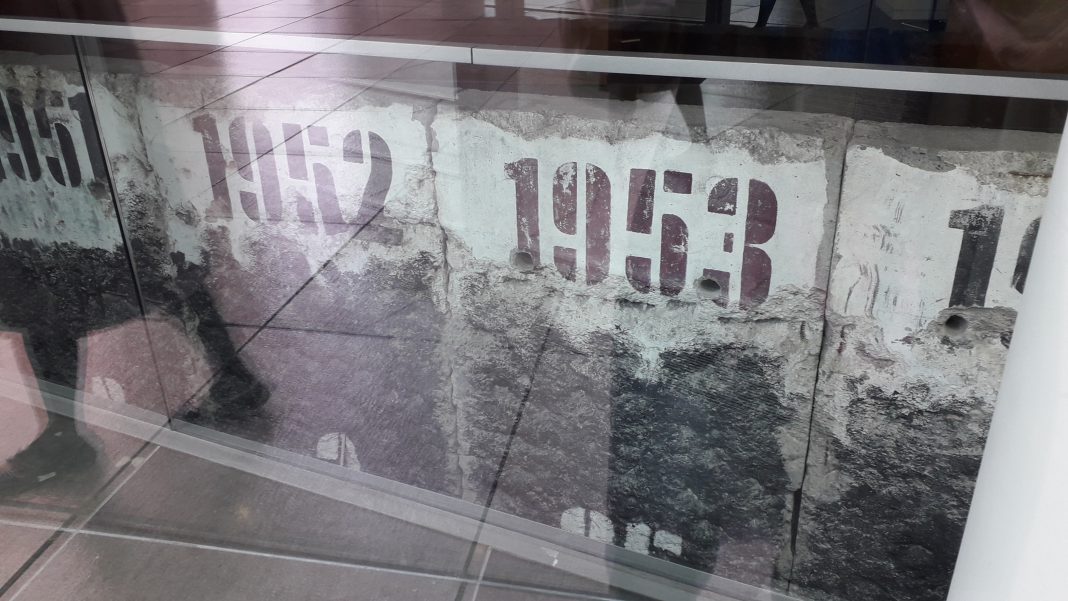
This is not RYE News !
This is the story of a Ryer!
Well done Heidi !
A very interesting article by Heidi Foster, about a person living through the political and family decisions of a turbulent times. The effects on all the people involved..
I saw a very good BBC programme on the anniversary of the fall of the Berlin Wall. And recall a girlfriend of a brother who’s family lived behind the wall.
It was a timely reminder of the horror of lives for people who lived under the East German communist regime.
The film Bridge of spies was also very good to help recall the tensions of living under the fear of the Stazi etc .
Every generation has to do all they can for freedom,truth,justice and mercy.
Excellent and timely article Heidi. At the end of World War II, there were seven border walls or fences in the world. By the time the Berlin Wall fell in 1989, there were 15. Today, there are at least 77 walls or fences around the world. Border walls and fences have been used throughout history to separate warring nations, protect trade routes and repel migrants and refugees.
Of course we have always had the sea, which can serve much the same purpose as a wall, but can also serve as a means to communicate with the world. I would always favour the latter, walls usually just create problems and amplify division.
Heidi – thank you so much for telling us this. xx
Sheila Melchers,
I assume you read the piece to make a comment. There are quite a few Germans who live in Rye and around.
Surely, just occasionally, it is worth to glimpse beyond one’s ‘four walls’ (Rye) into lives of local different people.
Thank you to everyone else who understood.
Heidi, that is so beautifully written.
As for Sheila Melchers who complains it is not ‘Rye News’ – it is in fact the story of someone who lives in Rye, and how her very interesting life has led her here. Where, indeed, she is a very well loved and most welcome member of our community.
I echo Timothy Gorman’s comments. Well done Heidi you are a great member of our community and it is so interesting to read this very well written piece in our Rye News.
What a touchingly poignant story Heidi thank you for sharing it with us at this time of increasing divisions.